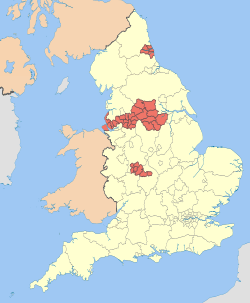Sefton Council
Sefton Council is the governing body for the Metropolitan Borough of Sefton in Merseyside, north-western England. The council was under no overall control from the 1980s until 2012 when the Labour Party took control. It is a constituent council of Liverpool City Region Combined Authority.[1]
Sefton Council | |
|---|---|
| Type | |
| Type | Metropolitan district |
| Leadership | |
Mayor of Sefton | |
Leader of the Council | Cllr Ian Maher, Labour |
Chief executive | Dwayne Johnson since June 2019 |
| Structure | |
| Seats | 66 councillors |
 | |
Political groups |
|
Joint committees | Liverpool City Region Combined Authority |
| Elections | |
Last election | 2 May 2019 |
Next election | 7 May 2020 |
| Meeting place | |
| Bootle Town Hall | |
| Website | |
| www.sefton.gov.uk | |
Wards
It consists of sixty-six councillors, three for each of the borough's twenty-two wards which are as listed:
Political makeup
Elections are usually by thirds, in three of every four years.[2]
| Party | Councillors | |
|---|---|---|
| Labour | 43 | |
| Liberal Democrats | 12 | |
| Conservative | 8 | |
| Independent | 3 | |
| Ind. Conservative | 0 | |
| Vacant | 0 | |
| Total | 66 | |
Since the 2017 General Election, Liberal Democrat Councillor Tony Dawson has been suspended by the party and two more Lib Dem councillors have defected to Labour, note change since last election.
| Year | Control |
|---|---|
| 2012–Present | Labour |
| 1986–2012 | No overall control |
| 1973†–1986 | Conservative |
Elections since 2000
Since 2000 the borough has been divided into 22 wards, each returning 3 councillors. This necessitated an election of the whole council in 2000, returning to a system of elections by thirds thereafter.[3]
| Year | Conservative | Labour | Liberal Democrats | UKIP | Green | Others | Control | |||||
|---|---|---|---|---|---|---|---|---|---|---|---|---|
| 2018[4] | 8 | 43 | 12 | 0 | 0 | 3 Independents | Labour | |||||
| 2016[5] | 6 | 38 | 17 | 0 | 0 | 4 - Independents 1 - Independent Conservative | Labour | |||||
| 2015[6] | 7 | 42 | 16 | 0 | 0 | 1 - independent conservative 1- community action not politics | Labour | |||||
| 2014[7] | 7 | 40 | 17 | 0 | 0 | 2 Independents | Labour | |||||
| 2012[8] | 8 | 36 | 20 | 0 | 0 | 2 Independents | Labour | |||||
| 2011[9] | 14 | 28 | 23 | 1 | 0 | 0 | No overall control | |||||
| 2010[10] | 15 | 23 | 28 | 0 | 0 | 0 | No overall control | |||||
| 2008[11] | 18 | 21 | 27 | 0 | 0 | 0 | No overall control | |||||
| 2007[12] | 18 | 22 | 26 | 0 | 0 | 0 | No overall control | |||||
| 2006[13] | 19 | 21 | 26 | 0 | 0 | 0 | No overall control | |||||
| 2004[14] | 19 | 20 | 27 | 0 | 0 | 0 | No overall control | |||||
| 2003[15] | 17 | 25 | 21 | 0 | 0 | 3 | No overall control | |||||
| 2002[16] | 16 | 26 | 21 | 0 | 0 | 3 | No overall control | |||||
| 2000[17] | 19 | 22 | 25 | 0 | 0 | 0 | No overall control | |||||
Elections 1973-1999
From 1973 to 2000 the borough was divided into 23 wards, returning 3 councillors each, giving a total of 69 councillors.[18][19] One third of seats was elected in three out of every four years.[20] Councillors had a four-year term of office, and there were elections to the Merseyside County Council were held in the years in which borough elections were not held until the county council's abolition in 1986.[20]
| Year | Conservative | Labour | Liberal‡ | Independent | Others‡ | Control | ||||
|---|---|---|---|---|---|---|---|---|---|---|
| Lib Dems‡ | ||||||||||
| 1999[21] | 15 | 30 | 24 | 0 | 0 | No overall control | ||||
| 1998[22] | 14 | 31 | 23 | 1 | 0 | No overall control | ||||
| 1992[23] | 25 | 27 | 17 | 0 | 0 | No overall control | ||||
| 1991[24] | 22 | 27 | 20 | 0 | 0 | No overall control | ||||
| 1990[25] | 24 | 27 | 18 | 0 | 0 | No overall control | ||||
| 1988[26] | 25 | 24 | 20 | 0 | 0 | No overall control | ||||
| 1987[27] | 27 | 24 | 15 | 0 | SDP 3 | No overall control | ||||
| 1986[28] | 30 | 24 | 12 | 0 | SDP 2 1 vacancy |
Conservative lose to no overall control | ||||
| 1984[29] | 36 | 22 | 9 | 1 | SDP 1 | Conservative | ||||
| 1983[30] | 39 | 21 | 7 | 1 | SDP 1 | Conservative | ||||
| 1982[31] | 39 | 20 | 5 | 1 | SDP 4 | Conservative | ||||
| 1980[32] | 39 | 22 | 5 | 1 | Ratepayers 2 | Conservative | ||||
| 1979[33] | 41 | 23 | 4 | 0 | Ratepayers 1 | Conservative | ||||
| 1978[34] | 44 | 21 | 3 | 0 | Ratepayers 1 | Conservative | ||||
| 1976[35] | 43 | 21 | 3 | 1 | Ratepayers 1 | Conservative | ||||
| 1975[36] | 40 | 22 | 3 | 2 | Ratepayers 2 | Conservative | ||||
| 1973†[37] | 37 | 24 | 3 | 2 | Ratepayers 3 | Conservative | ||||
- † The first election of councillors was on 10 May 1973. Sefton Council operated as a "shadow" authority before coming into its full powers on 1 April 1974. There were no elections in 1974, with elections by thirds starting in 1975.[20][37]
- ‡ The Liberal Party and the Social Democratic Party merged to form the Liberal Democrats in March 1988.
History
Sefton Council was created by the local government reorganisation of 1974, which created a two-tier system of government in the United Kingdom. It was a metropolitan district of the metropolitan county of Merseyside. Until 1986, the five metropolitan borough councils of Merseyside shared power with the central Merseyside County Council, but this was later abolished and its functions devolved solely to its districts. As a result, the borough is effectively a unitary authority within the ceremonial county of Merseyside.
Sefton Council is not directly responsible for transport, waste-disposal and emergency services - these are administered by joint-boards of the five boroughs of Merseyside.
References
- "Proposal to establish a combined authority for Greater Merseyside" (PDF). Department for Communities and Local Government. November 2013. Retrieved 10 December 2013.
- "Councillors, Meetings, Decisions". Sefton Council. Retrieved 9 January 2018.
- "The Borough of Sefton (Electoral Changes) Order 1999". The National Archives. Retrieved 11 September 2012.
- 2018 Summary - Sefton Council
- 2016 Summary - Sefton Council
- 2015 Summary - Sefton Council
- 2014 Summary - Sefton Council
- https://www.bbc.co.uk/news/special/vote2012/council/E08000014.stm
- 2011 Summary - BBC News
- 2010 Summary - BBC News
- 2008 Summary - BBC News
- 2007 Summary - BBC News
- 2006 Summary - BBC News
- 2004 Summary - BBC News
- 2003 Summary - BBC News
- 2002 Summary - BBC News
- 2000 Summary - BBC News
- Metropolitan County of Merseyside (Electoral Divisions and Wards) Order 1973
- Borough of Sefton (Electoral Arrangements) Order 1978 (S.I. 1978/1863)
- Local government in England and Wales: A Guide to the New System. London: HMSO. 1974. p. 184. ISBN 0117508470.
- 1999 Summary - BBC News
- "Local Elections results". The Times. 9 May 1998. p. 46.
- "Local election results 1992". The Times. 9 May 1992. p. 6.
- "Complete round-up of results from Thursday's local council elections". The Times. 4 May 1991.
- "Yesterday's Local election results". The Times. 4 May 1990.
- The Guardian, 6 May 1988
- The Guardian, 8 May 1987
- The Guardian, 4 May 1986
- "Labour takes Birmingham, Liberals do well". The Times. 4 May 1984. p. 5.
- "Labour capture Liverpool: Tories hold Birmingham". The Times. 6 May 1983. p. 4.
- "How the councils fared". The Times. 8 May 1982. p. 2.
- "Labour makes gains throughout Britain in local government elections". The Times. 2 May 1980. p. 4.
- Martin Minogue, ed. (1979). A Consumer's Guide to Local Government (2 ed.). Macmillan for the National Consumer Council. ISBN 9780333271162.
- "Power shift in only eight of 80 councils outside London". The Times. 6 May 1978. p. 3.
- "Conservatives control 17 metropolitan councils". The Times. 8 May 1976.
- "Tories capture 199 seats in 'big cities' poll triumph". The Times. 2 May 1975.
- "Three major parties find cause for satisfaction in local election results despite low poll". The Times. 14 May 1973.
